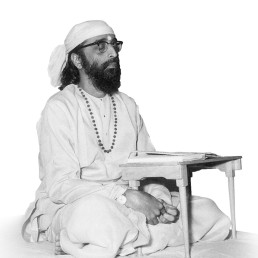
Jnana Yajna 106

Year & Dates:
July 15, 1962 to August 04, 1962

Yajna Topic:
Taittiriya Upanishad & Bhaja Govindam

Place:
New Delhi, India
A truly rare privilege was bestowed on the spiritual aspirants of New Delhi when Pujya Gurudev decided to teach the all-inclusive Taittiriya Upanishad during His 106th Jnana Yajna. He arrived in the capital city from Hyderabad on July 15, 1962, and that evening at 6 pm, He inaugurated the Upanishad yajna at the Community HaIl. The monsoon rains which had caused interruptions in the previous yajnas prompted the choice of an indoor venue, though the organizers had to be aware of the overflowing crowds.
On the auspicious and aesthetically decorated stage, Pujya Gurudev pointed out that the previous yajnas in Delhi were devoted to the Gita because of “the need to have a firm understanding of the Gita and the principles of Vedanta before we venture into the Upanishadic study.” To bolster the Vedantic mindset further, Pujya Gurudev chose the pithy and powerful verses of Adi Shankaracharya “Bhaja Govindam” for study during the morning sessions at the Hindu Maha Sabha Hall on Reading Road.
Seeking Liberating Knowledge
It was a stark and austere Jnana Yajna without any of the accompanying features from start to finish – like a dignitary speaker during inauguration, the Om flag-hoisting ceremony, or even the Gangajal-sprinkling and the concluding Guru Dakshina event. The deeply interested audience were led into deep study in both sessions of each day.
The melodious yet scathing verses of Bhaja Govindam, which is also called Moha Mudgara – the hammer which destroys delusions – compelled all to reexamine the worldly preoccupations that veil the divinity within. Pujya Gurudev minced no words when He taught these verses which are in “a crack-whip style and effect” just like He described in His introduction. His evening discourses on the Taittiriya Upanishad impressed on the contemplative audience the profound importance of mindful, dharmic living as a preparatory step for the Knowledge of the Infinite Brahman. He sparked the sense of wonder when He elucidated the Upanishadic verses on the limitless joy of Brahman and the order of creation in the world. And, when Pujya Gurudev dramatized the intense seeking of Bhrgu, the disciple, under the guidance of His Guru (and father), Varuna, for the Immortal Happiness or Brahman, the seekers understood how to undertake the process of deep enquiry both within and without.
A supreme blessing that the Delhi disciples and devotees experienced was the opportunity to offer a Paada Puja to Pujya Gurudev on Guru Purnima Day, July 17, 1962. It was a divine coincidence that they had performed the Paada Puja to the Lotus Feet of the greatly adored Pujya Gurudev in the previous year too. The uplifting Paada Puja brought to mind the last verse (v.31) of Bhaja Govindam which portrays the glorious result of loving surrender: “O Devotee of the Lotus Feet of the Teacher, May you become liberated soon from the samsaara through the discipline of the sense organs and the mind. You will come to experience (behold) the Lord that dwells in your own heart.” (Seek Govinda, Seek Govinda)…
A Meditation Minute:
निर्गुणे निश्चला निष्ठा सगुणे सरसा रतिः । सङ्गमो मधुरश्चायं देशिके नो महात्मनि ॥९॥
nirguṇe niścalā niṣṭhā saguṇe sarasā ratiḥ । saṅgamo madhuraścāyaṃ deśike no mahātmani ॥9॥
- In our Mahātmā teacher, there is a sweet confluence of firm abidance in nirguṇa (the attribute-less) and joyous revelling in saguṇa (with attributes).
We worship, with devotion and love, our Pujya Gurudev who indicated the Absolute in His every teaching while instilling a deep love for all deities extolled in our Puranas. His Jnana Yajnas were a sacred convergence – dedicated Karma was elevated by unwavering Bhakti to reach the peak of Knowledge. Form or Formless, Manifest or Unmanifest, Pujya Gurudev’s Vision was undivided and Whole.

“Think,” Says Pujya Gurudev
The philosophy of the Taittiriya is a brilliant idol wrapped in glorious optimism that in its shrine the sobbing and sighing man gets revived to a godly beauty that wears an eternal smile- the smile that wells up from a satisfied blissful heart. A man who has followed Taittiriya properly and realized the Truth indicated by it, can no more thereafter feel any imperfection anywhere in the world, since the plurality is but a superimposition upon Reality. Thus the Existence, wherever it be, is but the Existence borrowed from the Supreme!
Thereafter the entire world of multiplicity comes to wear a robe of Divinity and an aura of Perfection to one who is a true student of Taittiriya. There is no trace of cynicism nor is there, in the Taittiriya-view-of-life, any hint at the futility of life or the foolishness of recognizing a world. The world is no more a chain upon the soul but it is a glorious occasion to recognize the dynamism of the spirit and its perfection both in its transcendental and immanent presence. The world is Sukrtam: well-made, divinely-planned and perfectly-executed.
From Taittiriya Upanishad
No Time?
Bhagavan Shankaracharya highlights the entrapment within our mundane routines. Throughout life’s stages, we become consumed by busyness and preoccupations, leaving scant time for spiritual endeavors. From childhood through old age, worldly concerns dominate, making it arduous to prioritize spiritual growth. Without deliberate intervention, we become ensnared in the monotony of daily life, neglecting spiritual contemplation as we age.